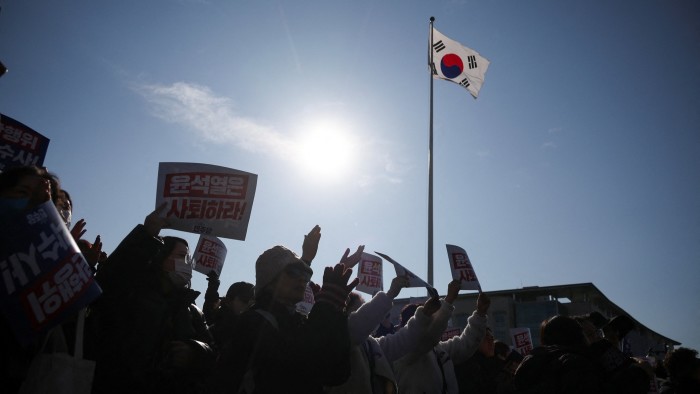Just six hours elapsed between South Korean President Yoon Suk Yeol’s declaration of martial law on Tuesday night and his subsequent climbdown, leaving the east Asian country in political turmoil.
As a hardline chief prosecutor serving under Moon Jae-in, his leftwing predecessor as president, Yoon oversaw the imprisonment of former conservative president Park Geun-hye and Samsung chair Lee Jae-yong following a bribery scandal that triggered Park’s impeachment in 2017.
Now, however, it is Yoon who is facing the prospect of impeachment and possible jail time after his botched political gambit left him severely isolated and apparently running out of time despite his term being formally set to run until 2027.
“He really has two options: resign or face impeachment,” said Gi-wook Shin, a professor of contemporary Korea at Stanford University.
Analysts described this week’s move as an act of desperation from an isolated and impulsive one-term leader boxed in by a slowing economy, historically low approval ratings and an opposition-controlled parliament.
Yoon’s apparent calculation that a bold declaration of martial law would rally rightwing political forces behind him appears to have backfired spectacularly, said analysts, leaving him even more politically and legally exposed than ever.
“How this martial law declaration was carried out is emblematic of Yoon’s presidency overall: poorly planned and even more poorly executed,” said Karl Friedhoff, a Korea expert at the Chicago Council on Global Affairs.
“Rather than facing impeachment for a series of personal and political scandals, he’s going to face impeachment for an attempted coup.”
Yoon’s troubled tenure and the dramatic move to impeach him are indicative of the “revenge politics” that dominate South Korea’s democracy, a divide that has persisted even with the country’s rising economic and cultural influence.
The divisions were clearly manifest in Yoon’s invoking of the spectre of North Korean influence in Seoul.
Suh Bok-kyung, a political commentator, noted that Yoon’s portrayal of opposition figures as “pro-North, anti-state forces” echoed formulations adopted by past South Korean authoritarian leaders to discredit political opponents.
“By comparing them to North Korea, he treats the opposition as our external enemy just because he thinks they are disrupting our national affairs,” she said.
“He is trying to take advantage of South Koreans’ long-standing trauma about the Korean war and communists, but this is wrong — he should have tried to persuade the public about why his policies are needed and to fairly compete with his political foes for public support.”
This week’s events have highlighted “both the vulnerabilities and resilience of South Korean democracy”, said Shin.
“It has exposed challenges and problems like polarisation, potential executive over-reach and weakened public trust,” she added. “But the swift rejection of martial law by the National Assembly and public outcry demonstrated strong institutional checks, civic engagement and the opportunity to reinforce democratic safeguards.”
A political novice when he was elected in 2022 by a margin of less than one percentage point over his leftwing nemesis, Democratic party leader Lee Jae-myung, Yoon brought an uncompromising approach to the president’s office.
But his bruising style has gone down badly with the South Korean public, while also alienating political allies including his erstwhile political protégé and fellow former prosecutor Han Dong-hoon, the leader of Yoon’s conservative People Power party who vocally opposed the president’s martial law declaration.
“He may have been a successful prosecutor, but he entered politics without much preparation,” said Shin. “He is completely out of touch if he thought he could run the country through martial law.”
Yoon has struggled to resolve prolonged stand-offs with striking doctors and labour unions, while his presidency has also been dogged by allegations swirling around his wife, first lady Kim Keon Hee, including suggestions that she accepted a bribe in the form of a luxury handbag from a Christian pastor, as well as engaging in stock manipulation and other misdemeanours.
Last month, Yoon vetoed the opposition’s latest attempt to launch an official investigation into Kim. In his statement to the nation, he cited opposition efforts to impeach prosecutors involved in decisions to drop investigations into the first lady as a justification for his decree.
“He seems genuinely to believe that he and his wife are political victims and those who are voicing dissent against them are anti-state forces,” said Shin Yul, a politics professor at Myongji University in Seoul.
Critics point out that Yoon has praised as “good at politics” former strongman Chun Doo-hwan, a South Korean general who seized power in 1979 and went on to oversee a series of massacres against student demonstrators. Until this week, Chun’s coup was the last time martial law had been declared in South Korea.
Friedhoff noted that since the collapse of Chun’s regime, South Korea’s democratic politics had been embroiled in a “revenge cycle” of never-ending partisan conflict. Of seven presidents elected since 1987, three have served prison sentences while another died by suicide while under investigation for bribery.
The irony, said experts, is that a national leader thrust into the political spotlight by his leading role in this cycle is, like so many of his predecessors, likely to be defined by it.
“There was a future in which he could have ridden out the last two years of his term and maybe avoided jail,” said Friedhoff. “But that ship has sailed, and he will most likely be branded as a traitor to Korean democracy.”




